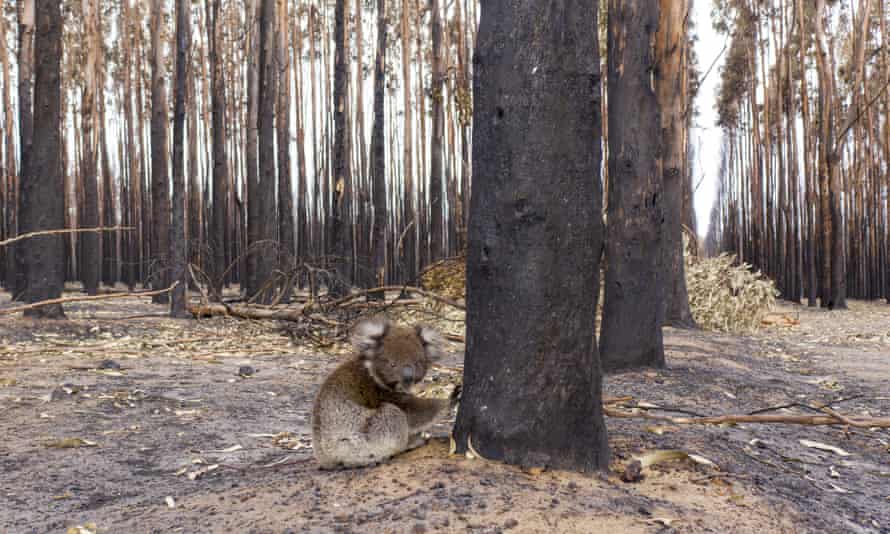Waste policy, climate adaptation and reform of conservation laws top government agenda, letter reveals

Last modified on Wed 3 Feb 2021 03.32 AEDT
The Morrison government has nominated waste policy, climate adaptation and reform of national conservation laws as its environmental priorities for 2021, prompting criticism that it is not focused enough on improving the plight of the country’s declining wildlife and threatened species.
In a letter to her state and territory counterparts, the federal environment minister, Sussan Ley, said the prime minister had written to her suggesting “three critical priorities” for the year. She asked her counterparts for their feedback.
The letter, seen by Guardian Australia, stated the country’s environment ministers would meet in the first half of the year.
They did not meet at all in 2020, prompting concern from conservationists about a lack of coordinated action in the wake of the devastating bushfires that killed or displaced an estimated 3 billion animals.
Ley said the federal government’s priorities were: continuing work on national waste policy, including monitoring the effects of a ban on exporting plastic, glass, paper and tyres; climate adaptation and bushfire recovery and resilience; and reform of the Environment Protection and Biodiversity Conservation Act, including moving to a so-called “single touch” system for environmental approvals “underpinned” by new national environmental standards.
The letter does not mention the 38 recommendations made by the former competition watchdog head, Graeme Samuel, in a review of the EPBC Act released last week.
The review’s final report, which was handed to the government in October, found that Australian governments had failed to protect the country’s wildlife over the two decades since the act was introduced and called for a complete overhaul, including the establishment of new independent bodies. It stressed several recommendations should be implemented immediately.
The government’s response to date has focused on its bid to transfer environmental approval powers to the states and territories, which Samuel recommended occur only once legally binding national environmental standards, with independent oversight, were in place.
Federal Labor’s environment spokesperson, Terri Butler, said Ley’s letter was a “shopping list of shameful inaction and spin”. She said Morrison had “not bothered” to convene a meeting of environment ministers at all in 2020, despite the destruction and devastation caused by the bushfire crisis.
“In the middle of a jobs and environmental crisis, each of the listed items has been mismanaged by a government that is slow, sloppy and bereft of vision to halt the decline of Australia’s natural environment,” she said.
James Trezise, a policy analyst at the Australian Conservation Foundation, said the next meeting of environment ministers should prioritise the full recommendations of the Samuel review..
He said environment ministers’ meetings had largely failed as a forum for driving and coordinating reform.
“It is very problematic that the [meeting], as the highest government forum for environmental policy issues, has not even discussed the response to last summer’s bushfire crisis,” Trezise said.
Tim Beshara, the manager of policy and strategy at the Wilderness Society, said since the Council of Australian Governments committee on environment was abolished by the former prime minister Tony Abbott, the meetings of environment ministers had become “ad hoc”.
“In those past seven years, environment ministers have only met nine times and haven’t met at all since the worst of the Black Summer fires,” he said.
“To properly protect Australia’s special places and turn around the extinction crisis, the commonwealth and states must be able to work together. Having a permanent arrangement to meet is a pretty basic requirement of being able to cooperate.”
Beshara said the inclusion of climate adaptation as a priority was “one major positive”. But he said if discussion of environmental law reform was limited to approval timeframes for major developments this would “miss critical challenges and further entrench environmental decline”.
The Greens environment spokesperson, Sarah Hanson-Young, said climate change and habitat destruction should be “at the top of the agenda for every environment minister in the country”.
“There’s just been a scathing once-in-10-year review of our environment laws and the Morrison Government has completely ignored it,” she said. “The PM should be asking the states to get behind the Samuel review and gear up for a comprehensive reform of Australia’s environment laws in-line with expert’s recommendations.”
A spokesperson for Ley said environment ministers had met in 2020 as part of a larger roundtable that included state Indigenous ministers in mid-September.
The spokesperson said Ley spoke and met with state colleagues “where needed on key reform”, including on waste, and the Morrison government was committed to working through the full detail of recommendations in Samuel’s report “with stakeholders including states and territories”.
Ley’s letter said four bodies – the Great Barrier Reef Ministerial Forum, the Lake Eyre Basin Ministerial Forum, the Wet Tropics Ministerial Council and the National Environment Protection Council – would be disbanded as recommended by a review of the former Coag councils and ministerial forums.
The spokesperson said on Tuesday the review of Coag councils had recommended the rationalisation of several councils and committees but those issues would be discussed by environment ministers at a future meeting.
.png)
No comments:
Post a Comment